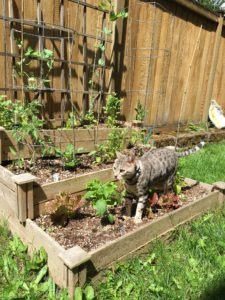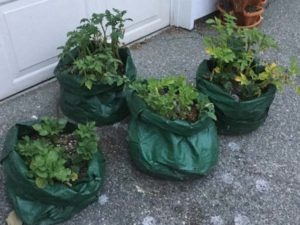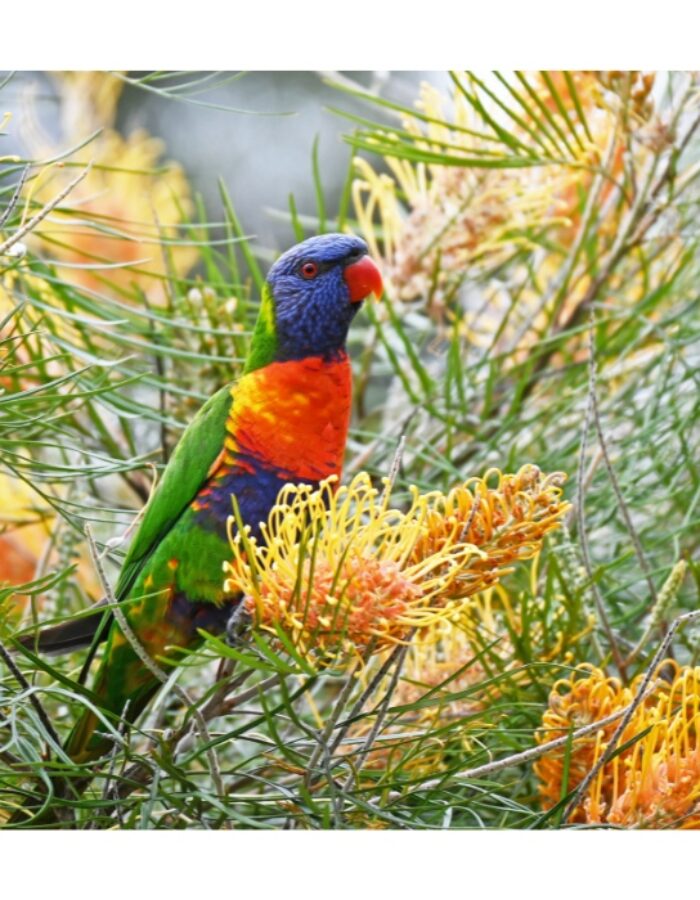Just beginning to garden on an empty piece of land? Or making over an existing one? It can be confusing if you consult magazines or websites to know where to start since many, even SGA’s, have articles on single topics without an indication of which are more important. Phil Mackie and Gwen Kestrel give us tips on what to focus on right from the start.
They each garden in different climates and with very different plants. They’re co-workers for an online company, but they bonded over shared hobbies, including gardening. They believe that sustainable gardening without the use of pesticides and chemical fertilisers should be the goal of all gardeners. Although their gardening backgrounds are different, their crops vary, the pests and diseases that threaten their crops vary, they’ve found strategies that are absolutely true for each of them to have the healthiest garden possible.
Phil’s been gardening since he was a boy, but is an off-and-on gardener, depending on the house or apartment he’s renting. Gwen’s garden could be said to have started in 2001 when she bought her house, she feels like she started really gardening in 2013 when she added her first raised bed for vegetables and started keeping chickens.
 For them, if a problem does arise then the first step is sustainable practices, instead of chemical based procedures because they do not want to poison their soil, produce, and the people consuming them. For Gwen, it’s also important to have a pet-safe garden for her two indoor/outdoor cats. They feel that indiscriminate spraying can kill insects that are beneficial and actually can create more problems.
For them, if a problem does arise then the first step is sustainable practices, instead of chemical based procedures because they do not want to poison their soil, produce, and the people consuming them. For Gwen, it’s also important to have a pet-safe garden for her two indoor/outdoor cats. They feel that indiscriminate spraying can kill insects that are beneficial and actually can create more problems.
“I don’t want to have other folks judging me, so I try to be patient with whatever other gardeners choose to do. I’m okay with using dish soap and water for some problems. Personally, I’d rather lose some plants than use commercial pesticides.” – Gwen
It is widely known that pests target plants that are unhealthy. This means that prevention is the best medicine and not only that, plants that are healthy grow the best tasting and larger crops.
Their tips are:
Aim for Healthy Soil
Having a healthy, diverse micro-organism and earthworm community in the soil means fertility. So avoid quick-resulting nitrogen based chemical fertilisers as they will do damage.
The most important thing you can do for your garden is to add compost and manures to your garden regularly. They offer a great supply of nutrients and also have a diverse array of micro-organisms. To compliment the compost and manures you can also add fish or seaweed based liquid fertilisers, which will give your plants a supply of more nutrients and will result in fast growth.
It’s often over-looked, but before Phil got started, he checked the pH level of his soil. There are several kits available, but beware that they can be inaccurate if there is a lot of organic matter in the soil. If your soil is too acidic or alkaline, you can take steps to bring the pH to neutral or change your selection of plants. Thankfully, the pH of his soil was easily brought back to neutral with the introduction of more compost.
Gwen lives on land with only a thin layer of top soil over the area’s naturally clay-heavy dirt. Her first attempts to start a garden were work-intensive and unsuccessful because of the quality of the soil. She learned the gardener’s  maxim about it taking a minimum of 7 years of composting and enrichment before the soil would be close to what she wanted. A modern woman, she looked for a more immediate solution and shortcut. Gwen went with raised beds. She’s using those clay-based beds for flowers and for vegetables like asparagus that don’t mind poor soil. Always looking to expand her gardening options, she even uses part of her driveway by growing potatoes and other edibles in sturdy green gardening bags. Gwen says:
maxim about it taking a minimum of 7 years of composting and enrichment before the soil would be close to what she wanted. A modern woman, she looked for a more immediate solution and shortcut. Gwen went with raised beds. She’s using those clay-based beds for flowers and for vegetables like asparagus that don’t mind poor soil. Always looking to expand her gardening options, she even uses part of her driveway by growing potatoes and other edibles in sturdy green gardening bags. Gwen says:
“For me, I want a hobby garden that produces enough to enhance my cooking and provide me with the freshest produce. I work full-time and I needed something that was a quick-start that I could enjoy from year 1.”
Retain Water
Water is clearly one of the most important requirements for a plant. Therefore, you must make sure that your plants are well watered. If you are adding compost to your gardens regularly then you will decrease the amount of water your garden needs. We both love the way the compost retains that moisture even in the sun.
Mulch helps to maintain moisture in the garden by insulating the soil and keeping the temperature constant. If the temperature in plants fluctuates highly, particularly in summer, plants will be stress and become more vulnerable.
Phil worries about too little water in the heat. Gwen worries about too much rain in the early spring drowning seedlings or turning fall/winter plantings like garlic to mush. Compost-enriched soil helps both of them.
 Gwen keeps a small flock of 3-4 chickens in her yard for fresh eggs (they also provide good fertiliser). With the space she uses for garden beds and the chicken coop, her yard is too small and shady to enable her to do yard waste composting, but the waste management service that picks up her yard waste provides free compost to anyone in the community.
Gwen keeps a small flock of 3-4 chickens in her yard for fresh eggs (they also provide good fertiliser). With the space she uses for garden beds and the chicken coop, her yard is too small and shady to enable her to do yard waste composting, but the waste management service that picks up her yard waste provides free compost to anyone in the community.
Optimal Sunshine and Air
Plants need to be exposed to sunshine and also to have good ventilation. This will stop any pests that are attracted by high humidity. Also a good site selection for your plants with regular pruning will help with the circulation of air.
“Because the way my property is situated, it was a balancing act between open sunlight and shade. I’ve found that my more delicate leafy green fare much better when their beds are against the fence and granted a little break from the sun’s rays throughout the day.” –Phil
Gwen has likewise gone with what works best for the areas of the yard. Recently, she turned half of her front lawn into an edible landscape with blueberry bushes, dwarf weeping mulberry trees, and grape vines.
Rotate Veggie Crops
In order to keep your plants healthy and pest free, the best practice is to rotate crops around the garden. Keep documentation of the planting rotation and make sure that you space the planting of the same crop in an area to at least three years.
“It’s hard to do this—not because it’s complicated, but because over there is the perfect spot for pea plants to climb up the back fence and in the front area, my peppers produced so well in the sun. For my small garden, it does mean that I don’t plant everything I love every year. For me that means I won’t have freshly-picked peas all the time, it’s ok because everything else grows better in the plot.” -Gwen
Attract Predators
Before beginning to control any suspected pest outbreak identify the pest. This is because the majority of insects are actually helping your garden and possibly keeping real pests under control.
It seems counter-intuitive but attracting the right insects into your garden will control or prevent the insects deemed pests. As opposed to chemical pest control, by recruiting helpful insects, the pests that are munching on your garden won’t be sticking around much longer. Examples of beneficial insects are ladybirds, lacewings and hoverflies, and some of these can be purchased such as ladybird larvae as well as predatory mites.
“I love spiders. I know they don’t hurt my plants and they’re likely feeding on bugs that do. My husband, Andy, thinks this is creepy, but is willing to let me capture-and-release any spiders that stray inside. But, what happens to the arachnids when I’m not home is a matter we don’t discuss.” – Gwen
Depending on your plants, birds might be your friends or your foes. In her garden of peas, peppers, tomatoes, carrots, and similar fare, Gwen has found birds to be good friends, ignoring her vegetables and helping with the insect issues.
Phil’s plantings include sunflowers and corn, so he does not encourage feathered visitors.
Choosing the Right Veggie Crops
If crops are planted off season, are from a different climate or require a pH different to your soil’s, they will not be healthy and will be attractive to pests.
Phil does a lot with companion planting. It is very important to interplant areas of individual crop within herbs, flowers and other crops that attract beneficial insects. If only one crop is planted, then there is more chance for the complete crop to be attacked by pests.
“A personal recommendation is to plant some chili peppers as a natural deterrent. The smell of the plant alone can keep some insects out of the garden, and you will have a reliable source of pepper for your homemade pesticide sprays. If you like to cook with peppers as I do, you will not need to stop by the grocer to add some heat to your meals.” – Phil
Gwen does more trial-and-error with small numbers of test plants to learn what works where. For instance, no matter where in her yard she tried it, her cauliflower plants developed a thick crust of flaky gray—downy mildew. It affects plants that are too damp. Since she can’t change the weather and isn’t interested in making major draining changes to the beds, she instead grows water-loving plants like tomatoes and peas.
Conclusion
These are just a few ways to have a healthier, organic garden. It’s tempting to reach for chemical fertilisers and pesticides, but taking time to diagnose and treat the underlying issues may save you from resorting to chemical treatment. The sun, water and crop arrangement of your garden are important details that, when carefully considered, can prevent the need for unnatural solutions. As the public becomes more aware of the cost of chemical additives, people will want healthier crops for their dinner table and their families.
Related Articles:
Garden Journaling – Slow down to tune in.
As we move through the year and our gardens evolve, there's something magical about documenting the journey. Garden journaling is an art that enables…
The Importance of building soil health for a biodeverse, productive garden
Creating a thriving garden that not only sustains itself but also contributes to the broader ecosystem requires more than just sunlight and water.…



